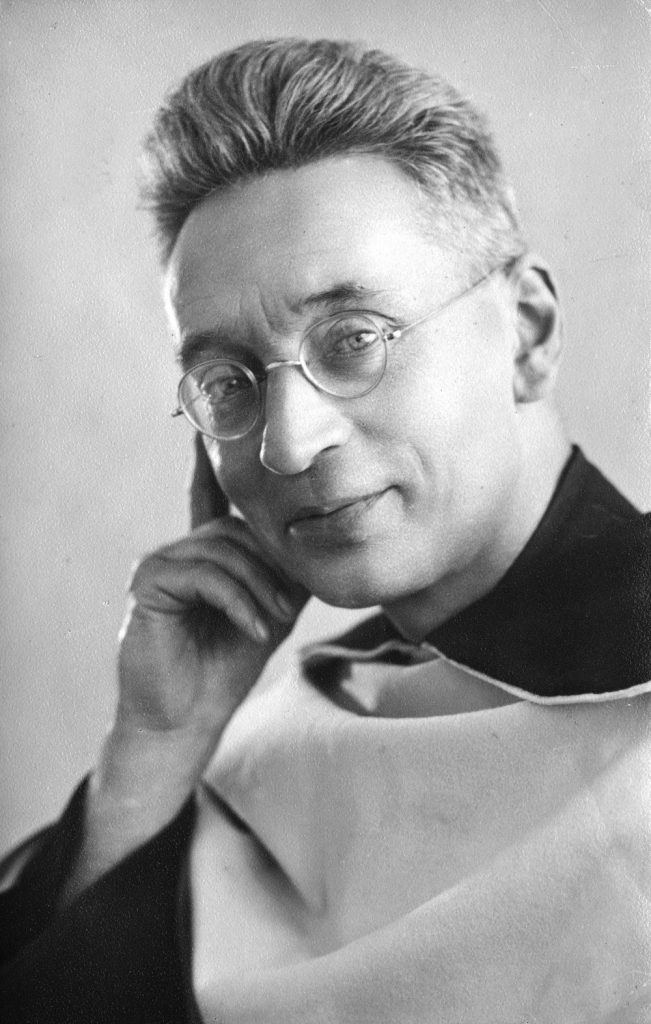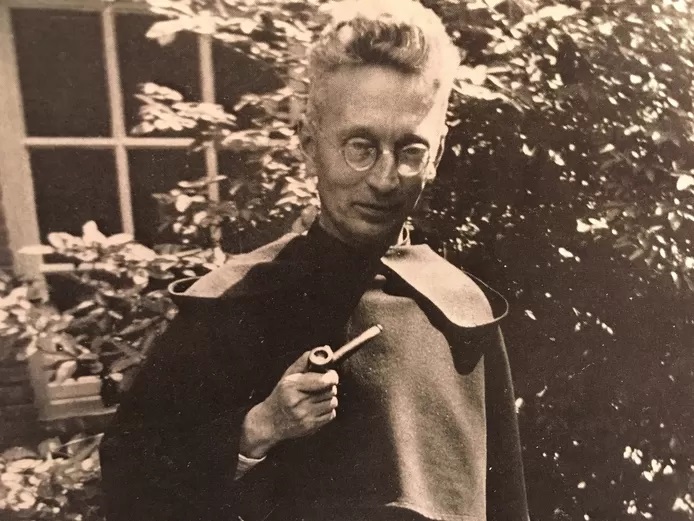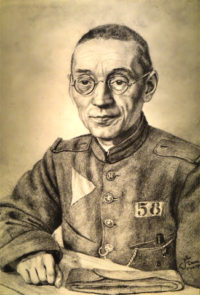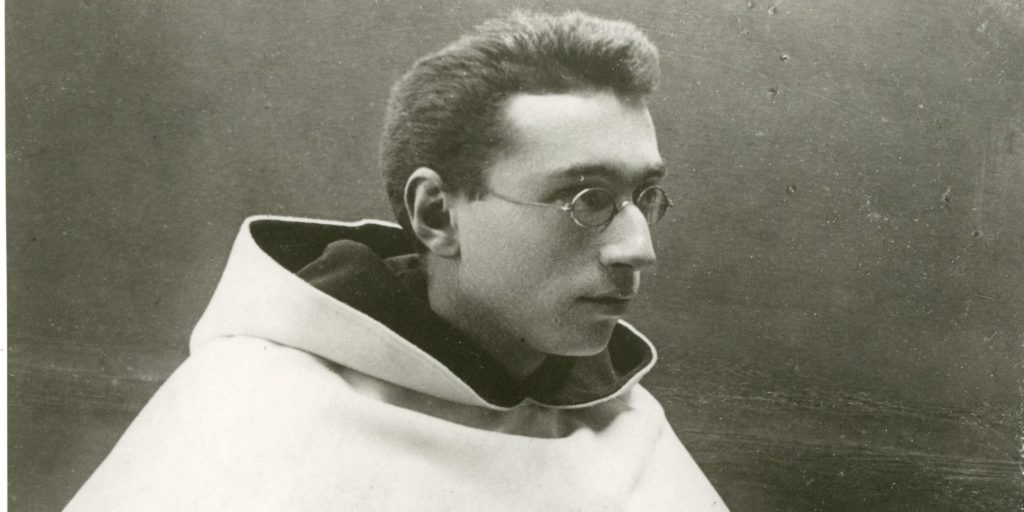
By Rev. Fr. Bernard Roosendaal, O.Carm.
July 26, 2013
Introduction

Titus Brandsma was a typical European, even more a typical Dutch, with an inborn western culture. He was an intellectual, deep religious and a man with his heart at the right place. He was kept connected with that umbilical cord of the Old and New Testament spirit and the Springs of Carmel allowing that spirit to freely flow through his blood stream, creating an open space in himself for that transcultural spirit of unbelievable humanness following the footsteps of the man from Nazareth and trying to live that out. The dehumanizing culture of Nazi Germany could not even silence that.
Titus Brandsma was a Carmelite, a priest, a university professor, a journalist, a mysticus, and was still very much at home “in the midst” of human society of his time. He understood very well what moved the Old Testament prophet and model for the Carmelites, Elijah, who struggled to keep his people away from a dehumanizing ideology of false gods promoted by those in power.
And Titus knows also how Elijah could do so and that kept him going forward: Elijah stayed close to Karith, the spring of flowing water, meaning, “Yahweh and the struggling people”. Titus was also able to continue drinking from that Biblical spring , and the rich Carmelite resources, while keeping in close contact with those struggling people around him for to remain human, even to the bitter end.
These two aspects: the unbelievable humanness and the ability to drink from that flowing water, I would like to present as a few aspect of Christian spirituality in the life of Titus Brandsma, which can be inspiring for us in the here and now in the Philippines.
Before going into this reflection, let us place Titus in his historical context and look at the short documentary on Titus Brandsma made in his home country , the Netherlands.
Reflection
Titus Brandsma was born, grew up and got his education in a traditional Christian family and society where the attention for the spiritual part of the human being, especially the soul, mixed with negative concepts of the body and everything which has to do with the human body, was glorified as the most important expression of real Christianity of a human being. Denying your body and human desires through corporal discipline and self-inflicted pain as flagellation, abstinence of food and creating hunger, were recommended by spiritual leaders in formation programs of monasteries and seminaries as a sure road to sanctity. Let us try to see some features of how the human being Titus, the Carmelite, professor, philosopher, theologian, mysticus in practice has lived his human life in a very disturbing time, till that very bitter and dehumanized end of being turned into ashes.
Titus the Educator
Jesus from Nazareth, the carpenter, went around in his beloved Galilee, teaching people and giving examples in his life how to live in response to God. People did not confuse him with the interpreters of the law, or with the scribes who work for the priestly hierarchy of the temple. Jesus is not an interpreter of the law. He hardly ever cites the Holy Scriptures, and never quotes the teachers who came before him. He belongs to no school and fits in no existing tradition. His authority surprised everyone. People had the impression of hearing from him about a radically different way of life.
Titus Brandsma traveled through his country in the late 1930’s to give talks especially to students and the many out of school youths not being reached by formal education about the development and spread of the dangerous ideology of National Socialism. He wanted to protect and give a warning to the young generation so dear to him as educator, teacher, and professor in the newly established only catholic university in the country. Titus saw the growing danger of poisoning young people with a false and distorted image of the human person, as being propagated by the Nazi ideology. Titus was very much worried about this development. He thinks that the image of the human being developed by Nazism is completely contrary to the way the Christian world thinks about the human being. Their way of thinking has to be condemned. Titus expressed the hope that the Christian image of the human being as image of God will not be brought in danger by a distorted German image, demanding that the human being must be a hero, molded to the pattern of the racist Nationalist Ideology of the Germans and becoming actually a deformed human being, imprisoned in racist thinking.
He was deeply concerned about the fact that many people, especially the young, were led astray by this Nazi enthusiasm and hero-attraction, giving-in to external things, as uniforms, extensive shouting, and comfort, without asking themselves what it is all about. It was a serious happening. The future for thousands was in danger. Education itself was in danger of becoming a manipulative tool in the hands of false ideologists. Freedom of education was at stake.
We may ask ourselves how it could happen that such a mind-setting could develop. One among the several factors for sure was the confusion created by the very bad economic situation in Western Europe. That was so deeply affecting all layers in European society, that everyone slowly got the idea that someone has to appear claiming the power of God. Great happenings, making deep impression on people, should come about soon, otherwise people cannot get out of the mess.
That is why there was a call for a strong man, a Superman, a Messiah. It was hanging in the sky. People were looking for extra-ordinary activities and happenings which would assure them that the expected messiah had arrived. You could hear it all over the place.
Hitler and his National Socialism took advantage of that situation. The superman-mania identified with the pure German-race, was propagated, the military apparatus to establish that world power was building up very fast, suggesting that a new and happy world was in the making.
And in that way, a not so healthy hero-worship was re-appearing. Young people were very much attracted to that and the educator in Titus took the consequences and he wasn’t afraid to leave the professors seat at the university to travel all around the country and meet the young.
A man so dedicated to academic education, shows not to be a prisoner of the lecture-rooms of his beloved University but was able to open the doors to informal education by going out as a daring human being and cared for the young.
National Socialism needs heroes.
Followers of the movement showed very clearly the essential feature of this hero-idealism expressed in “dominance”. The frustration felt everywhere was interpreted as caused by not giving enough space to the development of the own creative power of heroes. And this operates as poison. The basic human value of service in life was wiped off the table as being part of a false religion. Titus was deeply worried about that growing phenomenon.
Part of unused creative power becomes destructive power which may grow out at a demonic level. Their heroes, says Titus, are those people who want to be on top of others in order to make an impression. It is a banality. Their heroic acts are self-centered.
And that inextinguishable desire for power over others was nurtured by the Nazi-ideology. The others, those not belonging to the pure German race, do not exist, the other is seen as a rival. The own value of the other doesn’t exist for them, they negate the other. The human being is run over and finally killed.
The real heroic human being as seen by Titus is the one who sees the other, who doesn’t leave the suffering person to his or her fate, who doesn’t put the weak aside, does not discriminate other sexual oriented people, recognizes equality of men and women and respects them because he sees in them a spark of divine power. If the other experiences this, believing in self is again possible and a new life can start. The weak human being is basically a plea for the mystery of the human being as so beautiful expressed in the biblical expression that all human beings are created in the image of God, are co-creators and are equal. That is, for Titus, the ideal human being which has to be preserved at all costs.
That Titus Brandsma’s alarm and disturbance about the “Superman”, that distorted image of the human being propagated by Nazism, was very real and prophetic, history would tell us.
One of the many cruel examples. On Thursday January 22, 1943 the German soldiers evacuated the Jewish psychiatric Institute, The Apeldoornsch Bosch, in the Netherlands. Fifty personnel, 900 patients and 100 children, many almost naked, were without food, without medicines, without blanket loaded into a freight train at the station in Apeldoorn and direct deported to Auschwitz in Germany where all were immediately killed through the gas chambers. Titus did not experience that, he was killed a year before in Dachau.
It is amazing that Professor Titus took the risk of propagating real humanness, the ideal of a real human being against a dominant and false ideology of a distorted human picture propagated by a dehumanized and heavily armed upcoming world power. But that was Titus Brandsma, he was first of all a compassionate educator of humanness for the young, expressed in freedom of education, not the dominance by an ideology of power, not education that leads to dehumanization. For Titus Brandsma, freedom is on the top of the list of human rights. And freedom of education is free for an education to shape your humanity, your consciousness of being a human being as an image of God and also of belonging to and being responsible for that image, for that humanity. Nobody can be allowed to take that away from the young as well as the old.
Titus, the Journalist

Closely related to the freedom of education, was, for Titus, freedom of speech, in his time especially concretized in the freedom of the press. At Titus’ time the practically only available media were the printing media and the radio.
Titus was not only an extraordinary educator, he was also an exceptional journalist. Most of his articles he wrote were produced behind his study table at the monastery on the typewriter. And he had prepared them well ahead of time. Even six month after his death, a local weekly still published articles written by Titus Brandsma.
But when the journalist Titus and the national organization of Catholic journalist, of which he was the appointed national chaplain, were told what to write or not to write and to accept Nazi propaganda in the newspapers, Titus protested. The press was, for Titus, an exceptional tool of education and information, going beyond the boundaries of the academic world and reaching millions more. Freedom of the press was, for Titus, to be free for promoting human dignity, to follow the truth behind the facts. Killing human dignity is wiping off from the face of the world the face of the living God and that was, for Titus, not negotiable.
When the Archbishop of the Netherlands, Jan de Jong, at the end of 1941 finally asked Titus to convince the journalists and editors of newspapers not to publish articles in favor of the Nazi ideology, Titus left again the peaceful environment of the university, his monastery and the typewriter and went all around the country to get support for the freedom of the press. Titus took again the risk to defend a very important human value, freedom of the press, freedom of expression and could not be convinced to allow lies and a false ideology to poison the minds of people. And he paid a high prize for it. It costs him his own freedom. The Germans who had invaded the Netherlands in May 1940, qualified him as “being a very dangerous man” and put him in prison.
The prisoner Titus
It is a strange world in which Titus arrived after his arrest. In the first prison, Scheveningen, he is placed in a cell, a place of introspection, of silence and solitary dedication. Although a prisoner, Titus felt at home.

In the next prison, in Amersfoort, he was a companion to fellow prisoners, identified with them, and reached out to others, among them doctors, professors, teachers, priests, religious, pastors, workers, unbelievers etc., all together in one big smelly space, all dressed in dirty prison clothing with a number. People here were reduced to be just a number, no more name, no more identity.
Here, Titus, teacher and professor, lived and speaks still as a human being, goes beyond being a number, expressing knowledge and human experience. That was experienced by many prisoners in prison two when they got a few encouraging words from Titus while passing by their stretchers in the evening, shaking their hands and making a cross on their hands. In the darkness of their suffering they recognized that deep and warm human sign, a symbol of suffering but also of victory. The few words he was able to whisper in one’s ear, came from a human world of inner peace.
The prisoners proposed that Titus Brandsma would conduct a meditation on suffering on Good Friday. They were very much aware that it had to be done carefully because the Nazis did not allow religious gatherings. Titus spoke as a professor about the significance of a Dutch mystic, Geert Grote, and expressed the specific character of the Dutch mystic on suffering. It started like a lecture, but ended with a deep touching question on how it is possible to give meaning to suffering that is inescapable. A medical doctor, H. Grond, who was among Titus’ listeners as prisoner and who survived the war and prison life, described in 1946 what he got from the meditation of Titus. He said that hundreds of prisoners, professors, gypsies, believers and non-believers, religious, pastors etc., had moved into that smelly and crowded place, Hall III A. About this meditation he says the following and I quote:
“Small and weak he stood there in his gray old military uniform holding himself in between two beds; with a weak and monotonous voice he spoke in the deadly quiet space where hundreds were hungry to hear the words over divine mercy, love and human meaning of sacrifice and suffering…… And that is what Titus presented also to us as a great support in our difficulties, the daily meditation about God’s suffering for us, through which our suffering would mean just joy for Him. In his wounds we would find our healing, a truth heard many times but which became for us in this situation a complete new fire which made it possible for us to continue to love where humanly speaking only hatred could survive.”
Titus here was still the professor, now, not in a lecture-room, but integrated among the suffering people, very human with other suffering humans. He forgot about himself, his dehumanization and being degraded as a criminal, he showed here again that suffering does not need to take away our dignity as human being and being for service to the other.
In his struggle for freedom of education, and freedom of the press, Titus knew he was in line with the freedom so dear to Jesus. Jesus believed in God’s reign, that situation where there are right and just relationships lived out, where love for one another is experienced and peace is made possible. He believed in a world where universal freedom is possible. Jesus did not have any respect in his time for all those laws and regulations which imprisoned humanity. For him the only law was the law of love and he was in his time very much aware of the fact that people cannot live that out without getting in conflict with the Roman, Greek or Jewish law. And St. Paul knew that also. He says to accept Jesus does not mean freedom from all demands your environment would put on your head but it is more. It is a freedom for something. Meaning, freedom in open communion with one another, searching for new forms of living together. It is going beyond the pressures and demands, the injustices, the dehumanization of a certain environment or situation, it goes even beyond intellect and be guided by hope.
It is what we call a mystical experience and in this dehumanized situation, a mystical experience of freedom. Titus too knew that he could not escape conflict with the irrational demands of the Nazis, that is why he was in prison, but he did not lose his inner human freedom. There were other forms of living together in their situation and that was based on love for one another, being human together.
This was keenly observed by a certain Colonel Fogtelo after the meditation when he said: ”It is as if this man is in a free world”. This colonel sees the man who speaks on Good Friday about suffering, not being imprisoned by unknown blind powers, but that he lives in freedom like a gift. If that colonel does recognize this freedom in a violent world, then he discovers something new, a new kind of freedom.
Impossible to get to the bottom of it, only a few things can be said. Titus freed himself from his expectations, from his own ideas. He was liberated from that “keep holding on” and the fear, he becomes receptive for the power coming from God. A new power is growing in him which enables him to outgrow himself. And most mysteriously of this is that one is more himself or herself than ever before. He becomes more an image of God, or let us say it in another way: he is reflecting more clearly what God could be. It is a new freedom, a definitive freedom which cannot be taken away by anybody.
On Monday, April 27, 1942, Titus heard from a secret source that the headquarters of the Nazis in The Netherlands were contemplating to transfer Titus to Germany. That means the end and Titus knows it. That night he cannot sleep. A teacher, sleeping besides him, is much concerned when he heard Titus reciting one rosary after the other.
On transport
On May 16 a group of prisoners, among them Titus Brandsma, leaves The Netherlands and arrived in the late afternoon in the German town of Kleef, where the transit camp to Dachau is located. Here Titus experienced an unbelievable darkness, everything seemed to leave him, he experienced fear, insecurity, loneliness, hopelessness, sleepless nights. He makes a last trial to ask for less punishment and be transferred to one of the Carmelite monasteries in Germany. A final cry to be saved. “Father, if possible take this chalice away from me…”
No answer.
The powerless desire to save what possibly can be saved, Titus had to let it go. Titus is disillusioned. A person who cannot expect anything anymore.
In this Garden of Gethsemane, when everything lets him down, it gets painfully clear to Titus that he is asked to let go of his own expectations. Every resistance is useless and can bring someone to despair. Titus came to surrender and that means to give himself up.
He who offers himself to God, finds himself back as he had never been before. He finds the most essential of his existence. The suffering did not destroy the life of Titus, but kept it and purified it and so can have a new start again. Titus knows how important it is not to look back if once you have put your hand on the plow. He is even able to place a small piece of paper on the wall in his cell saying: “take the days as they come”. As if he quotes in his own words Teresa of Avila saying: Nada de Turbe. After almost a month of unbelievable struggle Titus had found himself back. His last resistance was broken, he surrendered and rose up to a new life of a dignified human being in a dehumanized environment.
June 16, 1942, Titus, with left hand tied to the right hand of a protestant minister and friend, is placed on transport to Dachau, where they arrived after six long days and nights. Passing through the entrance of the camp, he received a red triangle on his dirty jacket with No. 30492 on top, indicating that he is a political prisoner. Professor Titus Brandsma is a naked, shaved bold man. A number has been burned into his arm. From now on it is definitive, he has no name anymore, classified with a number like animals prepared to be slaughtered. He is stripped of all his dignity. Here is Titus subjected to the most ruthless brutality of life in a camp. And still he behaves as if he lives in freedom. His inner silence, his last possession, nobody can take that away. His last sparse words are a blessing and remind the disfigured human being on what life is all about.
In the midst of all dehumanization and cruelty Titus met the warm helping hand of a Dutch confrere, brother Rafael Tijhuis. Titus and Rafael are together when and wherever possible. The professor and the tailor of a Dutch Carmelite community, that difference doesn’t matter anymore. In this extermination camp exists another way of looking and thinking. They meet each other as persons, the uniqueness, the mystery of the human person. It is precisely the reverence for the person which brings them close to one another and at the same time creates a distance and gives free space. The experience of that deep human jewel of brotherhood has made the suffering for Titus a little more bearable, but did not take it away. Who suffers, suffers alone.
Extreme cruelties happened in the camp. Hunger, beatings, cold, unbelievable tiredness and always that pangs of death and that mountain of exhausted naked bodies. From this time on, Titus dies constantly. What he had expected from human life, he let go.
It is July 18, 1942, three men of the 2600 ministers in that camp, coming from 24 different nationalities, representing 39 different orders or congregations, moving stumbling through the mud from the field back to the camp. There were two Polish Carmelites, Hilarius Januszewski and Albertus Urbanski and in their midst Titus Brandsma. His arms around the shoulders of the two other humans, being his confreres. He is completely exhausted. It is his last human journey. Titus and the other Carmelites have experienced in that extermination camp the durability and the constant warmth of fraternal life as a very special feature that doesn’t disappear. This fraternal love purified in the fire of a dehumanized environment, is the last gift Titus received in Dachau.
Finally Titus accepts the suggestion of his confreres to be admitted in the “river”, the infamous camp hospital. This has for sure been a consolation for Titus, who was deadly tired, suffering deep in himself and praying for mercy. He realized that there is a God who pays attention and that he is in God’s hands and that his dignity cannot be touched.
That is also the reason that Titus is able to keep seeing the dignity of every human being notwithstanding the evil that one surrenders to. To give from what nobody can take away from him: his great respect for the human being, for his or her uniqueness. Titus experienced a spirituality of the abyss, the abyss of dehumanization and Titus shows that while being dehumanized, he did not lose his being human and was able to hold on to it until the very end and to share that with others. That is very deep rooted in Titus’ being. To share something with the other that which comes from within Titus.
The last one with whom he shared something, has given something, is with the nurse, Titia, who visited him with the doctor in the camp hospital.
The nurse said during the testimony before the beatification of Titus: “Titus gave me his rosary, but I said: I do not know how to pray. He then said: pray then at least the last words ‘pray for us sinners’.” The nurse, too, was dehumanized by the same system as Titus was. Both could pray the same prayer.
And like Jesus who at the last moments of his dehumanized life entrusted his mother Mary to the other, so Titus entrusted that small rosary, a dear symbol of Mother Mary, which he had kept so carefully, to the other. Titus kept holding on to a very basic human value of sharing, till the bitter end.
Now completely empty, he falls in coma. Two days later the doctor prepares the injection. That was according to plan. He has been, from the very beginning, on the list of the dead. Titus was used also for medical experiments. No longer of use anymore for medical experimentation, he was murdered. The nurse said during the beatification process: “I have given him personally the injection in the right pulse. He died ten minutes later at 2 pm on July 26, 1942. After that the doctor and myself went out”.
The next day his body was cremated.
As a light, he went down in the darkness of exhaustion and loneliness. Many were surprised that this light had kept unhindered its power and clarity. We may dare to say that Titus came close to what Prof. Boff said: “He was as human as only God can be”.
Drinking from Karith, his own sources

After all we may ask ourselves what was the secret of Titus to be able to do what he did and to live as he has lived.
Titus was a trained person having control over his deepest feelings. He had no need to ask much attention for his person. He doesn’t give the impression of being a self-oriented person, secretly looking for recognition. Titus did not talk much about himself and makes it difficult to say something about his deepest motivations. What was sure is that he was a deeply committed Carmelite and we know that he has been drinking for sure from his own sources and they were plenty.
Elijah, the biblical model for the Carmelites, the outspoken prophet in defense of Yahweh against the false gods promoted by the Baal priests and supported by King Ahab and his wife, could not say yes to the destruction of the covenant with Yahweh by accepting other and men-made gods.
Titus, well at home in the Carmelite tradition, must have been inspired by the Old Testament Prophet and model for Carmel, and could not accept the hero-idolatry introduced by the Nazis destroying the image of the true God by replacing it by a dehumanized and destructive power, and making the human being a toy in the hand of a dehumanizing ideology.
After the encounter with the Baal priests, Elijah was scared for the threats to his life by the wife of Ahab, left his environment and went to the rough mountain where he found the so much needed encouragement of Yahweh to continue his mission.
Titus left the serene environment of the university and the room in his monastery to expose himself to the young people and the journalists looking for answers of so many pressing problems. Titus found the inspiring God among them, and got encouraged to continue.
Told to be silent as journalist, he took the risk of going on the rough road to counter Nazi Germany’s effort to control and dominate freedom of expression and the press. The many good willing journalists and media people showed Titus the presence of the struggling God with his people. And Titus was encouraged to continue.
As Carmelite, he was living in the midst of the people in the downtown city of Nijmegen, The Netherlands, where the Carmelites had a monastery. The downtown was a squatters’ area and populated mostly by casual employees, heavy drinkers, professional prostitutes and beggars. In 1960 I was assigned in that area as a young priest in the function as director of the social action center. I was once approached by a beggar asking for money. When I told him that I didn’t have some, he said to me: “Father Titus Brandsma passing by here on his way to school always gave us something”. As a young priest trained in so called modern approaches in social action work, I was shocked. I had to give him a little amount. But personally I got more. I got a little inside from that well, from that source Titus was drinking being in the midst of the people, to nurture his search for the living God. And it were the simple, ordinary people, on the sidelines of his university city struggling to survive, who must have given him the needed encouragement to continue the struggle against any form of dehumanization, against any form of damaging the face of the living God in the people.
Imprisoned, dressed in old military uniform, shaven bold and being just a number, he saw God alive in the many prisoners listening to him on that famous Good Friday of 1942 in the camp. Writing his book in the camp on Teresa of Avila, he got inspiration from her saying of “Let nothing disturb you”, which Titus was able to translate to “Let it go”, which sounds like Jesus was saying in Gethsemane: “Not my will but the will of the Father will be done.”
When asking ourselves how Titus kept sane and human in such unbelievable suffering of dehumanization, we can only see that Titus has been drinking from the very beginning of his life as Carmelite, priest, professor, journalist and freedom fighter from his own springs, the biblical and Carmelite spiritual tradition and from the ordinary people in whose midst he was living. That was an essential part of Titus’ life of prayer and work which he was able to keep nourished in the midst of the people, even in the midst of the unbelievable dehumanized people.
Among the young, among the good willing journalist, among the urban poor in downtown Nijmegen, among the thousands of maltreated and dehumanized co-prisoners, even among the brutal German guards and soldiers, the first victims of that godless system of Nazism, Titus discovered that drinking from your own springs is not confined to books, monastery, spirituality study, but also and especially from those living springs along the bitter road of the human journey we have to make.
Especially in the camp, he was exposed to dehumanization and discovered New Springs, following Mary of Carmel, the Biblical model of a courageous young woman, who said yes to the call of life-giving, caring and daring for Jesus till under the Cross.
Titus opened, as university professor, the doors for informal education outside the formal lecture-rooms recognizing the rights of freedom for education of all; he stands squarely behind the hundreds of journalists who have been and are still searching for the truth behind the facts. Titus kept connected with the Father, with Jesus, his Spirit, with the people in whose midst he was living and working and that made him as he now is for us: the Blessed Titus Brandsma, mysticus, martyr for press freedom and education, resistance fighter, and human till the very bitter end, when he gave his rosary to the nurse and identified with those victimized by the godless Nazi-system. Such people are indeed dangerous and do ring a bell even in our own time.
Photos from the net.

